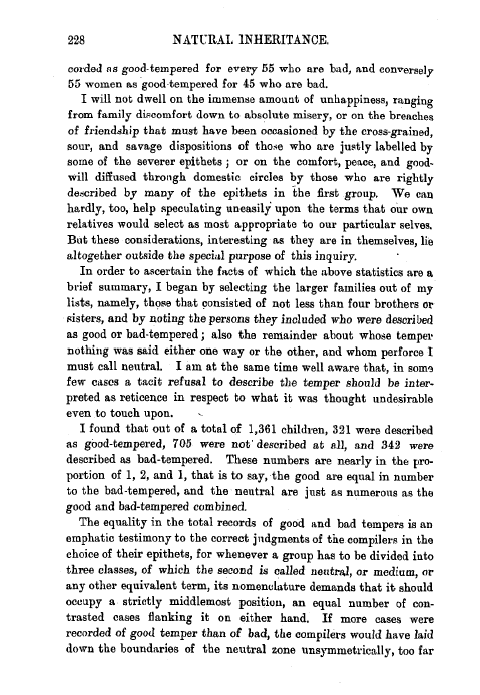228 NATURAL INHERITANCE.
corded as good-tempered for every 55 who are bad, and conversely 55 women as good-tempered for 45 who are bad.
I will not dwell on the immense amount of unhappiness, ranging from family discomfort down to absolute misery, or on the breaches of friendship that must have been occasioned by the cross-grained, sour, and savage dispositions of those who are justly labelled by some of the severer epithets ; or on the comfort, peace, and goodwill diffused throngh domestic circles by those who are rightly described by many of the epithets in the first group, We can hardly, too, help speculating uneasily upon the terms that our own relatives would select as most appropriate to our particular selves. But these considerations, interesting as they are in themselves, lie altogether outside the special purpose of this inquiry.
In order to ascertain the facts of which the above statistics are a brief summary, I began by selecting the larger families out of my lists, namely, those that consisted of not less than four brothers or sisters, and by noting the persons they included who were described as good or bad-tempered ; also the remainder about whose temper nothing was said either one way or the other, and whom perforce I must call neutral. I am at the same time well aware that, in some few cases a tacit refusal to describe the temper should be interpreted as reticence in respect to what it was thought undesirable even to touch upon.
I found that out of a total of 1,361 children, 321 were described as good-tempered, 705 were not' described at a.11, and 342 were described as bad-tempered. These numbers are nearly in the proportion of 1, 2, and 1, that is to say, the good are equal in number to the bad-tempered, and the neutral are just as numerous as the good and bad-tempered combined.
The equality in the total records of good and bad tempers is an emphatic testimony to the correct judgments of the compilers in the choice of their epithets, for whenever a group has to be divided into three classes, of which the second is called neutral, or medium, or any other equivalent term, its nomenclature demands that it should occupy a strictly middlemost position, an equal number of contrasted cases flanking it on either hand. If more cases were recorded of good temper than of bad, the compilers would have laid down the boundaries of the neutral zone unsymmetrically, too far

